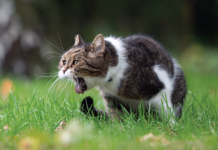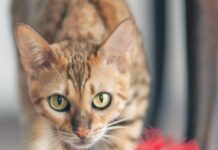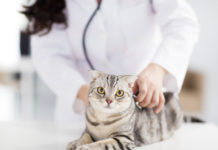Question: A friend of mine adopted a neutered male domestic shorthair from a shelter six months ago. His age was estimated to be about one year. The cat, named Mr. Seemly, lives indoors in an apartment he shares with his single owner, and hes proved to be a wonderful companion. Hes active and inquisitive, his physical appearance is fine, and his appetite remains good. But theres one thing that disturbs my friend. Directly after taking a drink, Mr. Seemly consistently coughs as if hes aspirated some water. Hes exhibited this behavior since adoption, but it hasnt become more frequent or dramatic. It is always associated with drinking water; to my friends knowledge he does not cough at any other time. Do you have any idea what this problem is? Do you think it is of great concern?
Answer: Its difficult for me to estimate the ultimate health risk Mr. Seemlys problem poses, but I do suggest asking a veterinarian to investigate it. The coughing is certainly not normal, and if swallowed liquid were to pass into the trachea in sufficient quantity, a serious lung disease could result.
Ive not personally treated any cats with Mr. Seemlys problem, and a quick search of the veterinary literature didnt turn up anything of much help either. But common sense, coupled with our shared experiences as swallowing creatures, might point us in the right direction. We all know what it feels like to have water go down the wrong pipe, and your description of Mr. Seemlys coughing sounds very similar. So if that is indeed the case, what could be going wrong? Well, unfortunately, lots of things. Swallowing is a very complex physiologic event that involves coordination of many structures; physical normality of the structures, along with normal nerve supplies, is required.
I think a reasonable first step down the diagnostic path is for a veterinarian to simply take a good look as far down Mr. Seemlys throat as possible. Heavy sedation or anesthesia will be necessary, and special equipment (like an endoscope) might be helpful to have on hand as well. If that fails to turn anything up, then X-rays of the throat area and chest would be the next step. These studies could be done by a regular veterinarian, and they would help determine whether the structures are normal. If these tests fail to disclose the cause, then referral to a veterinary specialty center might be required.
———-
Question: My cat is 14-years-old and I am most concerned about his health. He has always been quite vocal, but he is more so lately. He also walks between my legs as if to trip me. I had him on a diet for years (at one point he weighed 26 lbs.), but beginning last year he started to drop weight drastically. He now weighs just 11 lbs. but eats like a horse.
My veterinarian says his thyroid is now overactive and he indicated there are two options: radiation or medication. I have chosen neither as I do not want him to have radiation, nor do I like him to have too much medication. I am just feeding him as much as he wants of both canned (that is his passion) and dry food. What is wrong with my cat?
Answer: My guess is that your veterinarian has correctly diagnosed hyperthyroidism. Your cat is within the age bracket where we most often see the disease, and the little fellow is exhibiting signs that are quite typical of it, too. In fact, it almost sounds like your cat has read a veterinary textbook and is behaving accordingly! Hyperactivity, excessive vocalization, and weight loss in spite of a ravenous appetite are all common signs. Excessive water consumption and urination, vomiting, diarrhea, lack of grooming with a dirty-appearing oily coat, and overgrown claws are pretty common as well.
But theres really no reason to guess whats wrong; hyperthyroidism is usually very easy to diagnose with certainty. Your veterinarian has probably suggested, or has already performed, a test which measures the blood level of one of the thyroid hormones, thyroxine (T4). Elevation of T4, coupled with the characteristic signs and findings on physical examination, is usually sufficient to make the diagnosis. (See Hyperthyroidism in the January 2003 issue of CatWatch.)
Ignoring the problem wont make it go away! But I fear your decision to not treat your cat is seriously jeopardizing his health. Simply stated, if left untreated, hyperthyroidism kills cats. The disease severely affects virtually every organ system in the body, with the heart and the kidneys taking the biggest hits. Failure of either or both organs is the end result. If I could make printed words shout, Id do it here: You do NOT want to ignore this.
Your fears of the dangers of treatment are overstated, especially in light of the consequences of not treating. [Surgical removal of the overactive gland(s) is a third method you didnt mention.]
Treatment with iodine-131 – the treatment of choice for some thyroid conditions in people – is my personal favorite. I know the term radioactive iodine conjures up mental pictures of glowing cats, but this image is incorrect. The treatment is quite safe (Dr. Mew, the feline staff member of the Cornell Feline Health Center, will discuss this treatment in an upcoming issue of CatWatch), but each of the three main treatment options has advantages and disadvantages that you should discuss with your veterinarian – and I suggest doing so very soon.



